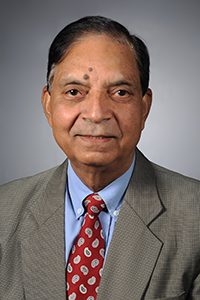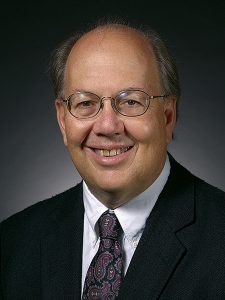Worldwide impact: Two engineering faculty selected for Jefferson Science Fellows Program
Author: Cyclone Engineering
Author: Cyclone Engineering
Two Iowa State University College of Engineering faculty members have been selected for the 2021-2022 Jefferson Science Fellows Program.
Ramesh Kanwar, Charles F. Curtiss Distinguished Professor in Agriculture and Life Sciences in the agricultural and biosystems engineering department, and Richard LeSar, professor of materials science and engineering department, will spend one year on assignment at the U.S. Agency for International Development (USAID) contributing their engineering expertise to USAID projects. Kanwar and LeSar are finalists who have been selected for Jefferson Science Fellowships contingent on receiving their security clearances with USAID.
“We are very proud to have two Cyclone Engineers in the 2021 class of the prestigious Jefferson Science Fellows program. Ramesh and Richard are both excellent examples of outstanding researchers who are committed to using their expertise to solve global challenges,” said W. Samuel Easterling, James L. and Katherine S. Melsa Dean of Engineering. “Iowa State engineering faculty chosen for such a selective national program demonstrate how our students are learning from professors who are top of their fields – and who are also truly passionate about using their expertise to improve the world,” said Easterling.
Ramesh Kanwar
 During his Jefferson Science Fellowship, Kanwar will work with USAID on the Environment Team in the Bureau of Latin America and the Caribbean, Office of Regional Sustainable Development.
During his Jefferson Science Fellowship, Kanwar will work with USAID on the Environment Team in the Bureau of Latin America and the Caribbean, Office of Regional Sustainable Development.
Kanwar is a worldwide leader in developing engineering solutions for emerging global environmental problems from agricultural and livestock production systems. His research interests are in the areas of water quality, irrigation, drainage, modeling of hydrologic systems, ecology, environment, climate change, agriculture and animal waste management, food and water security, and sustainable development.
Kanwar has lent his expertise to international development projects with the World Bank, EU, USAID, NATO and more than 50 foreign universities or governments. His outstanding contributions to his field have been recognized with multiple teaching, mentoring and research awards, including being elected a fellow of the American Society of Agricultural and Biological Engineers and National Academy of Agricultural Sciences in India and receiving honorary doctorates from three universities.
He has been mentor for 60 visiting professors/scholars, major professor for 30 M.S. and 31 Ph.D. students, and has published more than 550 papers, including 208 refereed journal articles. Kanwar received a B.S. in agricultural engineering from Punjab Agricultural University, an M.S. in irrigation and drainage engineering from G.B. Pant University Agriculture and Technology, and a Ph.D. in water resources and agricultural engineering from Iowa State University.
Richard LeSar
 During his Jefferson Science Fellowship, LeSar will work with the USAID at the Center for Education.
During his Jefferson Science Fellowship, LeSar will work with the USAID at the Center for Education.
LeSar is an internationally recognized expert in using computational methods to study the properties of materials. His current work is focused primarily on the development and application of polycrystal plasticity calculations based on discrete dislocation mechanics, the development of multiscale simulations of additive manufacturing, and an increasing focus on developing new computational environments for multiscale design.
He is the author of a textbook, Introduction to Computational Materials Science, published by Cambridge University Press, and is currently writing its second edition.
At Iowa State, LeSar has served as both department chair and Lynn Gleason Professor of Interdisciplinary Engineering. Before coming to Iowa State, he was a researcher and held administrative posts at the U.S. Department of Energy’s Los Alamos National Laboratory. LeSar earned his B.S. in chemistry from the University of Michigan and his A.M. in physics and Ph.D. in chemical physics from Harvard University.